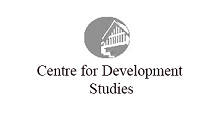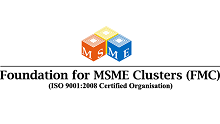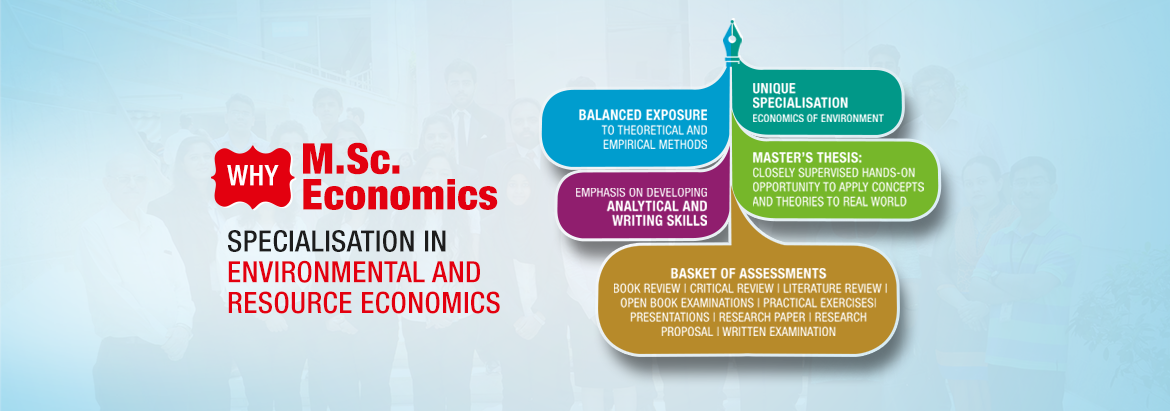
ANNOUNCEMENTS

The pressure on the non-human component of the ecosystem that we witness today can largely be attributed to the intensified pursuit of material consumption by a growing mass of population in the post-war period. Environment and Resource Economics attempts to recognize, understand, analyse, and evaluate the nature-society exchanges towards their implication on human well-being. Towards addressing this, it aims to design and implement effective policy instruments that assist in sustaining a given quality of life on earth and its enhancement over a longer time horizon. It involves rigorous grounding in standard economic theory and techniques and a simultaneous exposure to a wide variety of economic challenges due to the ecological / environmental / natural resource constraints.
The syllabus for the programme is frequently revised by bringing in updating the curriculum and introducing hands-on- practical session with the software packages like STATA and R as well as case studies and examples from policy making domains making domains. The quality of the curriculum is regularly evaluated by its stakeholders, peers, alumni and employers. The faculties are involved in active research with funded projects from SANDEE, DST, and several other funding agencies who regularly publish in the leading journals across the spectrum of economics. The programme also has a have received consistent appreciation from the students. Many of its alumnus have joined PhD programme in prestigious universities in India and abroad.
This programme has been offered by TERI SAS since 2009. The quality of students, their performance, cent percent placement and the expertise of the faculties make it one of the flagship programmes offered by the Department of Policy Studies as well as by the University.
At the end of pursuing the MSc (Economics) with specialization in Environment and Resource Economics program the students are expected to:
• Gain in-depth knowledge of the concepts and theories of Economics with core aspects of ecological, environmental, and natural resource economics.
• Receive hands-on experience in applying economic concepts, theories, and methods towards analysis, appraisal and evaluation of a wide range of economic problems and policies.
• Develop analytical and writing skills through preparation of critical review, literature survey, research proposal and Masters’ Thesis.
• Develop and apply quantitative skills including numerical, statistical and econometric analysis using packages such as STATA and R.
MSc (Economics) with a specialization in Environment and Resource economics is unique as it not only includes advanced graduate level exposure to microeconomics, macroeconomics, mathematics, development economics, growth economics, statistics, and econometrics, but our students also receive an in-depth knowledge of the concepts, theories, techniques, policies and other applications in ecological, environmental, and natural resource economics. It offers a wide choice of specialized optional papers as well.
The Master’s Thesis is mandatory, if not the most important component of the programme. It provides a hands-on opportunity to the students to apply economic concepts, theories, and methods towards analysis, appraisals, and evaluation of a wide range of environmental problems and policies so as to demonstrate their ability as research professionals. All students are supervised by one or more faculty members and every thesis is reviewed extensively by a panel of experts to ensure quality, originality and rigour. The quality of the dissertations has been appreciated in various forums including national and international conferences. Some of these dissertations have also resulted in publications in peer- reviewed journals.
The students are encouraged to undergo a summer internship at the end of the second semester, which trains them to translate theoretical knowledge into applied research as conducted at think-tanks and industries. Desirous students are also provided with placement assistance. Our former students have obtained placements in the government, corporations, think-tanks, international organizations, civil society organizations, and research institutes of repute.
Some students have also opted for higher studies in academic institutions like Centre for Development Studies, Delhi School of Economics, Jawaharlal Nehru University, John Hopkins University, University of California, Riverside, University of Warwick, Vanderbilt University, and Yale University, university of Tennessee Knoxville , Drexel University and others.
About The Oikonomia Club:
Oikonomia, the Economics Club of TERI School of Advanced Studies, was founded in 2022 by the M.Sc. Economics batch under the guidance of Dr. Priyanka Arora. The club serves as a vibrant platform for students to engage in the world of economics beyond traditional coursework, cultivating a passion for the subject through both innovative and interactive learning experiences.
Our initiatives encompass diverse formats such as “Econopoly”, mock auctions, case study competitions, and group discussions, complemented by expert lectures and panel sessions. These activities are designed to enhance understanding of economic concepts while nurturing core skills including analytical thinking, decision-making, teamwork, and effective communication. Oikonomia is committed to making economics engaging and accessible, encouraging participation from all students in a welcoming environment. The club reflects a dynamic student community where enjoyment and growth go hand in hand, preparing members not just for academic excellence but for leadership and success in professional arenas.
About the Magazine (The Panorama Pulse):
The Panorama Pulse is the official magazine of Oikonomia, the Economics Club at TERI School of Advanced Studies. It serves as a creative and rigorous platform for Economics students to share their perspectives, research, and analyses on emerging issues in policy, society, and the environment. Written, curated, and designed exclusively by students, the magazine reflects a vibrant student voice embodying curiosity, critical inquiry, and the spirit of intellectual adventure.
Every edition foregrounds the diverse experiences and academic interests of the TERI SAS Economics community, celebrating the ways young economists interrogate theory and engage with the real world. By championing student-led discourse and original thought, The Panorama Pulse brings economics to life, making complex ideas accessible, interdisciplinary, and deeply relevant for our times.
• About October 2025 Issue
PDF Version: The Panorama Pulse OIKONOMIA 2025-26
The October 2025 issue of The Panorama Pulse, titled "Weighing Progress: Where Trade, Justice, and Nature Find Equilibrium," offers a compelling exploration of the interconnectedness of global trade dynamics, social justice, and environmental sustainability. This edition showcases insightful student contributions examining critical topics such as the evolving BRICS-USA trade relations, economic exclusion in sports, the cultural and economic significance of Indian classical dance, queer perspectives in economics, hydrocarbon exploration, carbon credit mechanisms, and the humanitarian-economic crisis in Gaza. Through rigorous analysis, case studies, and personal narratives, this issue invites readers to rethink conventional notions of progress, emphasizing that true advancement requires a balanced integration of prosperity, equity, and ecological responsibility. The rich diversity of voices and multidisciplinary approaches embodied in this issue reflects the vision of The Panorama Pulse to foster thoughtful dialogue and innovative solutions within the TERI SAS community, inspiring a holistic understanding of economics in the modern world.
The learning experience gained at the TERI SAS was, for the most parts, intellectually stimulating. This was driven by the great faculty . The M.Sc. dissertation was an added bonus too. Since I wanted to do a PhD in Economics, the core courses taught, the interaction with the professors and the MSc. dissertation were of critical importance. All have helped me gain admission to Warwick, as well as provide a good base for graduate level courses. The single most important contributor to my achievements at Warwick has been the faculty at the TERI SAS. I believe they were successful in sustaining my interest in the subject and pushed me to do a PhD at Warwick. Their trust and faith still helps me push my academic boundaries. I would like to remember TERI SAS as an important stepping stone for my academic career. My experience at TERI SAS was fulfilling and gainful

I am grateful to the faculty of MSc Economics and the TERI School of Advanced Studies for providing me an opportunity to become a part of the University of Graz, Austria, as an exchange student, for the Summer Semester of 2025 through the Erasmus Plus International programme. The city of Graz has truly impressed me, not only with its scenic beauties but also with the generosity and kindness of its residents. The financial grant that I received effectively covers all essential expenses like house-rent, food, utilities, and transportation, that allows me to focus on the academics without any financial concerns. I am looking forward to gaining new insights at the University, particularly in Economics and Sustainability, while engaging with a diverse group of individuals from around the globe.

This university taught me so much of what I needed to know, gave me great opportunities and helped inspire me to pursue a career in economics. I can never forget the first day as a naive 20 year old when our course coordinator asked me what do you hope to learn here? And I said, I hope I can master the basics of economics, and undoubtedly the university helped me achieve my goal as well as fostered my research interests in environmental economics. With amazing professors who care about your learning and even more wonderful colleagues, it was truly the best two years of my life. Thank you TERI .

The curriculum design of the M.Sc progamme at TERI School Od Advanced Studies (Deemed to be University), New Delhi is progressive and unlike anything that the majority of Indian education system has yet embraced. Right from the first semester, the curriculum was dynamic and the evaluation was continuous. There were take - home assignments, presentations. open book examinations, term papers, and even 24 - hors exams! The focus was never to simply to reproduce different chapters and readings in the exam but rather, on the analysis and understandins.
TERI faculty has been supportive and always encouraged us to pursue our area of interest.




































| Year | Courses | Credits | Duration* |
| First Year | |||
| 1st Semester | 5 core courses of 4 credits | 20 | 15 weeks |
| 2nd Semester | 5 core courses of 4 credits | 20 | 15 weeks |
| Second Year | |||
| 3rd Semester | 2 core course of 4 credits + Electives courses of 12 credits | 20 | 15 weeks |
| 4th Semester | Master's Thesis | 20 | 15 weeks |
* Does not include mid and end-semester breaks and evaluation schedules (based on major and minor tests and assignments)
| Semester 1 | ||||||
| Course No. | Course Title | Type | Number of Credits | No. of L-T-P | Course Coordinator | Course Offered |
| MPE 117 | Real Analysis and Optimization | Core | 4 | 48-12-0 | Dr Malvika Tyagi | Yes |
| MPE 127 | Macroeconomics-I | Core | 4 | 60-0-0 | Dr Shantanu De Roy | Yes |
| MPE 134 | Microeconomics-I | Core | 4 | 44-16-0 | Dr Aditi Singhal | Yes |
| MPE 184 | Development economics | Core | 4 | 58-0-4 | Dr Malvika Tyagi | Yes |
| MPE 186 | Econometrics -I | Core | 4 | 57-0-6 | Dr Priyanka Arora | Yes |
| Semester 2 | ||||||
| Course No. | Course Title | Type | Number of Credits | No. of L-T-P | Course Coordinator | Course Offered |
| MPE 114 | Linear Algebra and Dynamic Optimization | Core | 4 | 51-9-0 | Dr Malvika Tyagi | Yes |
| MPE 129 | Macroeconomics-II | Core | 4 | 60-0-0 | Dr Shantanu De Roy | Yes |
| MPE 137 | Microeconomics-II | Core | 4 | 60-0-0 | Dr Aditi Singhal | Yes |
| MPE 152 | Environmental economics | Core | 4 | 52-8-0 | Prof. Sukanya Das | Yes |
| MPE 187 | Econometrics-II | Core | 4 | 46-0-28 | Dr Priyanka Arora | Yes |
| Semester 3 | ||||||
| Course No. | Course Title | Type | Number of Credits | No. of L-T-P | Course Coordinator | Course Offered |
| MPD 165 | Energy Economics, Policy and Finance | Elective | 4 | 48-12-0 | Dr Gopal Sarangi | Yes |
| MPE 122 | Indian agricultural development: Contemporary Issues | Elective | 4 | 60-0-0 | Dr Shantanu De Roy | No |
| MPE 153 | Natural resource economics | Core | 4 | 54-0-12 | Prof. Sukanya Das | Yes |
| MPE 154 | Economics of health and environment | Elective | 4 | 43-15-4 | Prof. Sukanya Das | Yes |
| MPE 156 | Theory of Contracts | Elective | 4 | 49-11-0 | Prof. Badal Mukhopadhyay | Yes |
| MPE 157 | Auctions and Mechanism Design | Elective | 4 | 54-6-0 | No | |
| MPE 176 | Methods of research in economics | Core | 4 | 46-4-20 | Prof. Sukanya Das | Yes |
| MPE 188 | Labour Economics | Elective | 4 | 60-0-0 | Dr Shantanu De Roy | No |
| MPE 193 | Trade, Development and Environment | Elective | 4 | 60-0-0 | Dr Shantanu De Roy | Yes |
| Semester 4 | ||||||
| Course No. | Course Title | Type | Number of Credits | No. of L-T-P | Course Coordinator | Course Offered |
| MPE 108 | Master's thesis | Core | 20 | 0-0-600 | Prof. Sukanya Das | Yes |
For past program/course outline see: Archive M.Sc.(Economics)
The choice of the method depends on objective of enquiry. These comprise classroom lectures, case studies, computer lab work, term papers, assignments and tutorials, guest lectures by policy makers and experts, seminars and discussion forums etc.
- Designed to equip the students with not only the basic skills, tools and analytical abilities but also with the capacity to think through any given research problem.
- Variety of assessments across the spectrum: from critical review and literature survey to preparation of research proposal and practical’s
- Meticulously supervised Masters’ Thesis.
- Vibrant mentoring system

The Master’s Thesis is a mandatory component of the MSc Economics programme. It has the highest credit load of 20 out of 72 and spreads across the entire 4th semester. It requires the student to conduct meaningful and grounded research in economics with a focus on ecological, environmental and resource economics, the specialization of the MSc Economics program. The first three semesters of MSc Economics program are designed in a way to provide skills and sound knowledge in basic economic theory and its practices. The foundations of the thesis are laid down in the core course titled “Methods of Research in Economics” (MPE 176; third semester). It takes the students through the entire spectrum of research design, that begins with theories, concepts, frameworks and models and ends with a Research Proposal for a Masters’ Thesis. Ordinarily, the student will write a Master’s Thesis based on this Research Proposal, under the supervision of faculty/external experts, as decided by MPEC of MSc Economics programme.
The Master's Thesis provides a hands-on opportunity to the students to apply economic concepts, theories, and methods towards analysis, appraisals, and evaluation of a wide range of environmental problems and policies so as to demonstrate their ability as research professionals. The quality of the dissertations has been appreciated in various forums including national and international conferences. Some of these dissertations have also resulted in publications in peer-reviewed journals.
Plot No. 10, Institutional Area, Vasant Kunj, New Delhi - 110 070, India.
Tel. +91 11 71800222 (25 lines).
Website : www.terisas.ac.in
Email id : registrar@terisas.ac.in
© Copyright © 2025, TERI SAS, All rights reserved.
Visitors No.: 47994479 Since 2023


